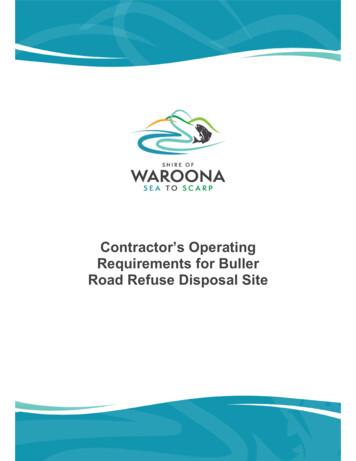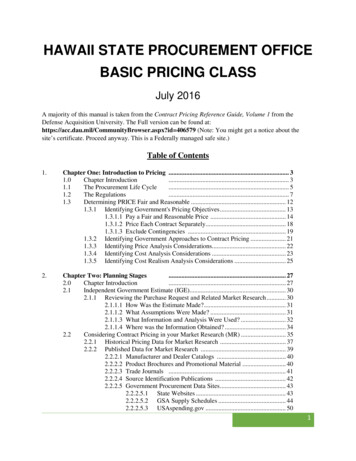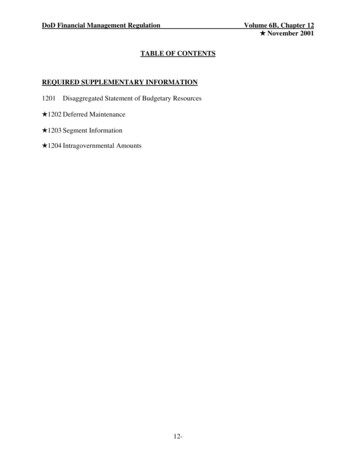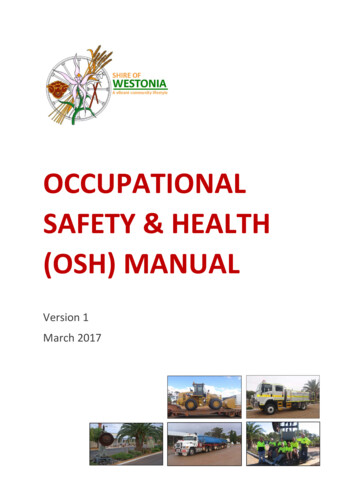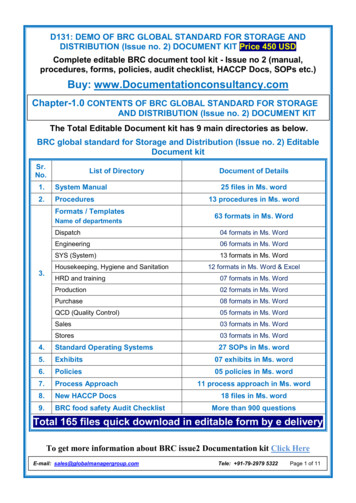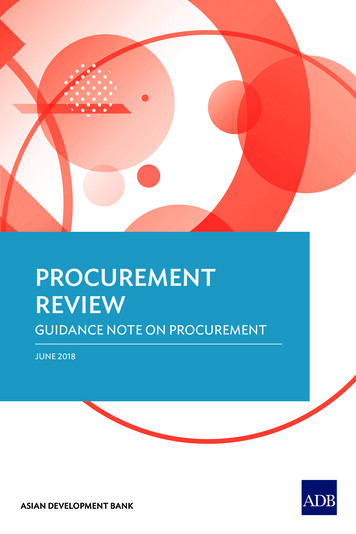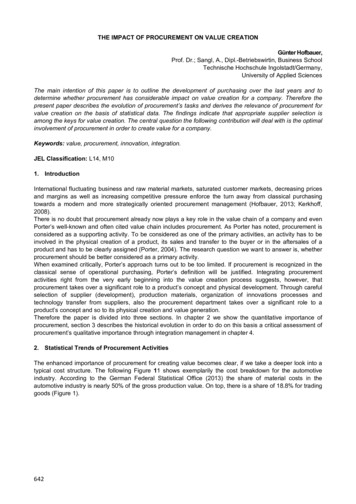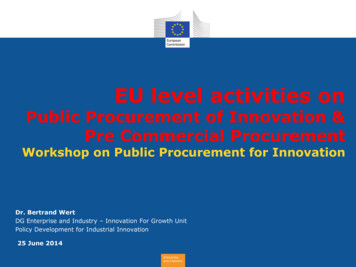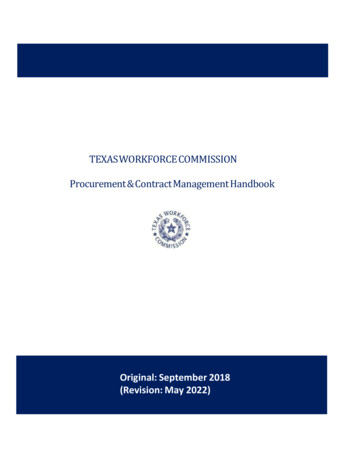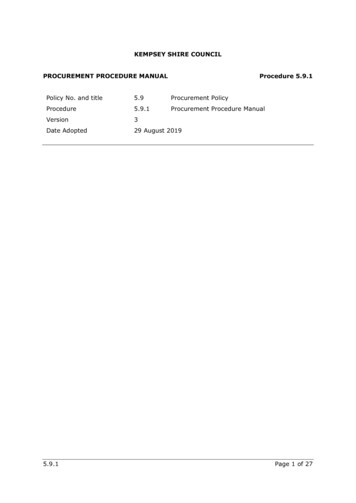
Transcription
KEMPSEY SHIRE COUNCILPROCUREMENT PROCEDURE MANUALProcedure 5.9.1Policy No. and title5.9Procurement PolicyProcedure5.9.1Procurement Procedure ManualVersion3Date Adopted29 August 20195.9.1Page 1 of 27
Table of Contents1Principles . 41.1 Objectives . 41.2 Scope . 51.3 Purpose . 51.4 Guiding Principles . 51.5 Treatment of GST . 71.6 Definitions and Abbreviations . 72Effective Legislative and Policy Compliance and Control . 82.1 Ethics and Probity . 82.1.1Requirement. 82.1.2Conduct of Councillors and Council Staff . 82.1.2.1General . 82.1.2.2Members of Professional Bodies . 92.1.3Conduct of Tenderers . 92.1.4Procurement Processes . 92.1.5Conflict of Interest . 92.1.6Fair and Honest Dealing . 92.1.7Accountability and Transparency . 102.1.8Gifts and Hospitality . 102.1.9Disclosure of Information . 102.1.10 Collusion . 112.2 Governance . 112.2.1Structure . 112.2.2Standards . 112.2.3Methods . 122.2.4Responsible Financial Management . 122.3 Procurement Thresholds and Competition . 135.9.12.3.1Requirement . 132.3.2Minimum Spend Competition Thresholds. 132.3.2.1Tenders. 132.3.2.2Quotations . 132.3.2.3Assessment of Quotations . 162.3.2.4Acceptance of Quotations . 172.3.2.5Purchase Orders. 172.3.2.6Preferred Supplier Arrangements . 17Page 2 of 27
2.4 Delegation of Authority . 182.4.1Requirement . 182.4.2Delegations . 182.4.2.1Council Staff . 182.4.2.2Council Delegations and Powers . 182.5 Internal Controls . 192.6 Commercial Information . 192.7 Risk Management . 192.7.1General . 192.7.2Supply of Contract . 192.8 Contract Terms . 202.9 Endorsement . 202.10 Dispute Resolution . 202.11 Contract Management . 203Demonstrate Sustained Value . 203.1 Integration with Council Strategy. 203.2 Achieving Value for Money . 213.2.1Requirement . 213.2.2Considerations . 213.2.3Role of Specifications . 223.3 Performance Measure and Continuous Improvement . 223.4 Diversity . 223.5 Support of Local Business . 223.6 Occupational Health and Safety and Design . 23Attachment A - The Australian Competition and Consumer Commission proposedanti collusion tender clauses . 24Attachment B - Green Procurement Iniatives . 26Attachment C - Tender/Quotation Evaluation Form.275.9.1Page 3 of 27
1Principles1.1ObjectivesKempsey Shire: 1.25.9.1Recognises that:oDeveloping a procurement strategy and adopting appropriate bestpractice contracting and procurement principles, policies, processes andprocedures for all goods, services and works by Council, will enhanceachievement of Council objectives such as sustainable and sociallyresponsible procurement, bottom-line cost savings, supporting localeconomies, achieving innovation, and better services for communities.oThe elements of best practiceprocurement incorporate:applicabletolocalgovernment Broad principles covering ethics, value for money, responsibilitiesand accountabilities. Guidelines giving effect to those principles. A system of delegations (i.e. the authorisation of officers to approvea range of functions in the Procurement process). Procurement processes, with appropriate procedures coveringminor simple Procurement to high value complex Procurement. A professional approach to all major procurements.Requires that its contracting and purchasing activities:oSupport the Council’s corporate strategies, aims and objectivesincluding, but not limited to those related to sustainability, protectionof the environment, and corporate social responsibility.oConsider the whole life cycle of an acquisition, from initial concept tothe end of the useful life of an asset, or the end of a service contract.oAchieve value for money and quality in the acquisition of goods, servicesand works by the Council.oCan demonstrate that public money has been well spent.oAre conducted, and are seen to be conducted, in an impartial, fair andethical manner.oSeek continual improvement including the embrace of innovative andtechnological initiatives such as electronic tendering processes toreduce activity cost.oWhere practical generate and support business in the local community.ScopePage 4 of 27
This Procurement Procedure is made under Section 211 of the Local Government(General) Regulation 2005.This section of the Regulation requires that a Council or person purporting to acton behalf of a council must not incur a liability for the expenditure of moneyunless the council has approved the expenditure and voted the money necessaryto meet the expenditure.This procedure applies to all contracting and procurement activities at Counciland is binding upon Councillors, Council Officers and temporary employees,contractors and consultants while engaged by the Council.1.3PurposeThe purpose of this Procedure is to: 1.4Provide guidance to the Council to allow consistency and control overProcurement activities.Demonstrate accountability to ratepayers.Provide guidance on ethical behaviour in public sector purchasing.Demonstrate the application of elements of best practice in purchasing.Increase the probability of obtaining the right outcome when purchasinggoods and services.Guiding PrinciplesCouncil will be guided by the principles for procurement contained in theTendering Guidelines for NSW Local Government.Standards of Behaviour and Ethical Principles Honesty and fairnessAccountability and transparencyConsistencyNo conflicts of interestNo anti-competitive practices.ConfidentialityInformation received from tenderers (intellectual property, propriety,commercial-in-confidence or otherwise confidential) is not disclosed withoutprior consent from the Tenderer. All details of a tendering process, including arecommendation of the tender evaluation must not be disclosed before theoutcome of the tender has been determined.Conflicts of InterestCouncil staff have an obligation to disclose potential or actual conflict of interestsbetween their public duties and their personal or private interests. The benefitor loss could be financial or non-financial. The objective of disclosing intereststhat are or could be in conflict with official duties is to ensure promptconsideration, comprehensive assessment and where necessary theimplementation of alternative working arrangements or other action deemednecessary.Value for money5.9.1Page 5 of 27
Council will seek to obtain the best quality and value for price, ensuring that thequality of the goods or works meets any set criteria and cost constraints.Obtaining value for money does not mean Council is obliged to accept the lowestprice.Support of Local Business (Local Preference)Council is committed to buying from local businesses where such purchases maybe justified on value for money grounds.Aboriginal Employment ParticipationIn certain circumstances tenderers will be required to indicate measures theyintend to implement if awarded the contract, which are designed to lead toimproved conditions in Aboriginal communities.Additional principles guiding Council’s procurement are:Open and Fair CompetitionAll prospective suppliers and vendors will be treated equally and fairly in an openand transparent manner without bias or perception of bias. The same access toinformation about proposed procurement will be provided to all prospectivesuppliers and vendors to enable tenders and quotations to be submitted on thesame basis.AccountabilityA consistent approach to procurement will be achieved through compliance withprocurement principles, processes and procedures. The ‘procurementframework’ will be robust and nominate relevant council officers and theirresponsibilities, and provide clear lines of responsibility and accountability. Alltransactions will be adequately documented to enable and facilitate audit.Risk ManagementCouncil recognises that all procurement carries some risk and as a result willadopt pro-active and ongoing management strategies to minimise risk.Probity and TransparencyCouncil will conduct their business in a fair, honest and open manner,demonstrating the highest levels of integrity consistent with the public interest.SustainabilityCouncil is committed to adopting a procurement approach that supports theprinciples of sustainable procurement.During the procurement life cycle Council will commit to reducing consumptionof resources and minimising waste, including: 5.9.1Encouraging and preferring eco-friendly products which are more powerefficientSelecting energy, fuel and water efficient productsPreferring to purchase from a source which is less polluting or uses cleantechnologyPage 6 of 27
1.5Considering the provision of re-usable products and recycling as part of theproject planning process, including the consideration of whole of life costsand disposal considerationsBuying recycled or part recycled products to optimise consumption andstimulate demand for recycled productsEncouraging suppliers to adopt good environmental practices.Treatment of GSTAll monetary values stated in this policy include GST except, where specificallystated otherwise.1.6Definitions and AbbreviationsTermDefinitionActLocal Government Act 1993Commercial in ConfidenceInformation that, if released, may prejudice thebusiness dealings of a party e.g. prices,discounts, rebates, profits, methodologies andprocess information, etc.Contract ManagementThe process that ensure both parties to a contractthat fully meet their respective obligations asefficiently and effectively as possible, in order todeliver the business and operational objectivesrequired from the contract and in particular, toprovide value for money.Contractors and ConsultantsThe staff of contractors, sub-contractors andconsultants while engaged by Council.Council StaffIncludes full time and part-time council officers,and temporary employees.ProbityThe dictionary definition of probity refers touprightness, honesty, proper and ethical conductand propriety in dealings. Within Government,the word “probity” is often used in a generalsense to mean “good process”. A Procurementprocess that conforms to the expected standardsof probity is one in which clear procedures thatare consistent with the Council’s policies andlegislation are established, understood andfollowed from the outset. These procedures needto consider the legitimate interests of suppliersand ensure that all potential suppliers are treatedequitably.StandingArrangements (SOA)Sustainability5.9.1OfferA contract that sets out rates for goods andservices which are available for the term of theagreement. However, no commitment is madeunder the agreement to purchase a specifiedvalue or quantity of goods or services until aPurchase Order is raised (also referred to asperiod contracts, annual supply contracts,schedule of rates contracts, or panel contracts).Activities that meet the needs of the presentwithout compromising the ability of futuregenerations to meet their needs.Page 7 of 27
2ProcurementProcurement is the whole process of acquisitionof external goods, services and works. Thisprocess spans the whole life cycle from initialconcept through to the end of the useful life of anasset (including disposal) or the end of a servicecontract.Tender ProcessThe processquotation orfollowed byselection of aValue for MoneyValue for Money in Procurement is about selectingthe supply of goods, services and works takinginto account both cost and non-cost factorsincluding: Contribution to the advancement of theCouncil’s priorities; Non-cost factors such as fitness forpurpose,quality,OH&Srisks,environmental priorities, service andsupport; and Cost-related factors including whole-oflife costs and transaction costs associatedwith acquiring, using, holding, maintainingand disposing of the goods, services orworks.Emergency ServicesA situation that the Council or General Managerhas resolved to be an emergency under whichcircumstances Section 55(3) of the LocalGovernment Act will apply.of inviting parties to submit atender by public advertisement,evaluation of submissions andsuccessful bidder or tenderer.Effective Legislative and Policy Compliance and Control2.1Ethics and Probity2.1.1RequirementCouncil’s procurement activities shall be performed with integrity.2.1.22.1.2.1Conduct of Councillors and Council StaffGeneralCouncillors and Council Staff shall at all time conduct themselves inways that are in accordance with the Code of Conduct and are seento be, ethical and of integrity and will: 5.9.1Treat potential and existing suppliers with equality andfairness.Not seek or receive personal gain.Maintain confidentiality of information such as contract pricesand other sensitive information.Present the highest standards of professionalism, transparencyand probity.Deal with suppliers in an honest and impartial manner that doesnot allow conflicts of interest.Provide all suppliers and tenderers with the same informationand equal opportunity.Page 8 of 27
Be able to account for all decisions and provide feedback onthem.Council Staff who are responsible for managing or supervisingcontracts are prohibited from performing any works under thecontract they are supervising i.e. staff cannot also work for thesupplier or contractor.2.1.2.2Members of Professional BodiesCouncillors and Council staff belonging to professional organisationsshall, in addition to the obligations detailed in this policy, ensurethat they adhere to any code of ethics or professional standardsrequired by that body.2.1.3Conduct of TenderersTenderers are expected at all times to conduct themselves in ways thatare, and are seen to be, ethical, and of integrity and will present thehighest standards of professionalism and probity.2.1.4Procurement ProcessesAll procurement processes shall be conducted in accordance with therequirements of this procedure, relevant legislation, relevant AustralianStandards, Councils procurement policy and the Act.2.1.5Conflict of InterestCouncillors and Council Staff shall at all times avoid situations in whichprivate interests conflict, or might reasonably be thought to conflict, orhave the potential to conflict, with their Council duties.Councillors and Council Staff shall not participate in any action or matterassociated with the arrangement of a contract (i.e. evaluation,negotiation, recommendation, or approval), where that person, anymember of their immediate family or any person with whom they havea close association has a significant interest or holds a position ofinfluence or power in a business undertaking tendering for the work.The onus is on the Councillor and the member of Council Staff involvedbeing alert to and promptly declaring an actual or potential conflict ofinterest to the Council.2.1.6Fair and Honest DealingAll prospective contractors and suppliers must be afforded an equalopportunity to submit a tender or quotation (to the extent that theminimum required number of quotes has been obtained as per section2.3.2.2).Impartiality must be maintained throughout the procurement process,so that it can withstand public scrutiny;The commercial interests of existing and potential suppliers must beprotected. Confidentiality of information provided by existing andprospective suppliers must be maintained at all times, particularlycommercially sensitive material such as, but not limited to prices,discounts, rebates, profit, manufacturing and product information.5.9.1Page 9 of 27
2.1.7Accountability and TransparencyAccountability in procurement means being able to explain and provideevidence on the process followed. The test of accountability is that anindependent third party must be able to see clearly that a process hasbeen followed and that the process is fair and reasonable.Therefore the processes by which all procurement activities areconducted will be in accordance with the Council’s Procurement policiesand procedures as set out in this procedure and related Council policiesand procedures.Additionally: 2.1.8All Council Staff must be able to account for all Procurementdecisions made over the lifecycle of all goods, services and workspurchased by the Council and provide feedback on them.All procurement activities are to leave an audit trail for monitoringand reporting purposes.Gifts and HospitalityFor the purposes of acceptable behaviour regarding acceptance of giftsrefer to Part 5 of Procedure 5.1.1 – Code of Conduct.Additionally:2.1.91.Councillors and Council Staff must not accept hospitality fromcontractors or their representatives, or from organisations, firms orindividuals with whom they have official dealings. Councillors andCouncil Staff should also avoid the ambiguous situation created byvisiting the premises or a contractor, organisation, firm or individualuninvited and/or not on official business.2.Offers of bribes, commissions or other irregular approaches fromorganisations or individuals (no matter how flimsy the evidenceavailable), must be immediately brought to the attention of theGeneral Manager.Disclosure of InformationInformation received by Council that is commercial in confidence mustnot be disclosed and is to be stored in a secure location.Councillors and Council Staff are to protect, by refusing to release ordiscuss the following: Information disclosed by organisations in tenders, quotation orduring tender negotiations.All information that is commercial in confidence.Pre-contract information including but not limited to informationprovided in quotes and tenders or subsequently provided in precontract negotiations unless required to so by law and then only tothe extent the law requires.Councillors and Council Staff are to avoid references to any contractsin discussion with acquaintances or outside interests.5.9.1Page 10 of 27
Discussion with potential suppliers during tender evaluations shouldnot go beyond the extent necessary to resolve doubt on what is beingoffered by that supplier with information provided to all potentialtenderers.At no stage should any discussion be entered into which could havepotential contractual implications prior to the contract approval processbeing finalised, other than authorised pre-contract negotiations.2.1.10 CollusionAttachment A details clauses which may be included in tenderspecification documents so as to deter collusive behaviour.The Council is committed to ensuring that it deals with suppliers in afair and ethical manner and expects to be treated in a similar manner.To assist in ensuring that this occurs the Council will include standardclauses in all of its tender documentation that makes it clear that theCouncil will report any suspicion it has, relating to collusive behaviourby tenderers or contractors, to the relevant authorities.2.2Governance2.2.1StructureCouncil shall: Establish a procurement management responsibility structure anddelegations ensuring accountability and traceability of allprocurement decisions made over the lifecycle of all goods, servicesand works purchased by the Council. ensure that the Council’s procurement structure:oooo2.2.2Is flexible enough to purchase in a timely manner the diverserange of material, goods, works and services required byCouncil.Ensures that prospective contractors and suppliers are affordedan equal opportunity to tender/quote.Encourages competition.Ensures that policies that impinge on the purchasing policiesand practices are communicated and implemented.StandardsThe Council’s procurement activities shall be carried out to theprofessional standards required by best practice and in compliance withthe: 2.2.35.9.1Local Government Act.Council’s policies.Department of Local Government Tendering Guidelines 2009.The Council’s Code of Conduct.Other relevant legislative requirements such as but not limited tothe Trade Practices Act, Goods Act, and the EnvironmentalProtection Act.MethodsPage 11 of 27
The Council’s standard methods for purchasing goods, services andworks shall be by one of the following processes: Purchase order following a quotation process from suppliers ofgoods and services that represent best value for money underdirected quotation thresholds.Under contract following a tender process.Using aggregated purchasing arrangements with other Councils,(Local Government Procurement Service).Purchasing card.Petty cash and other reimbursement systems.Other arrangements authorised by the Council or the GeneralManager on a needs basis as required by abnormal circumstancessuch as emergencies.Council may, at its discretion and based on the complexity and cost ofthe project, conduct one stage or multi-stage tenders.Typically a multi-stage tender process will commence with aregistration/expression of interest stage followed by a tender processinvolving the organisations selected as a consequence of theregistration of interest stage.Expressions of Interest (EOI) may be appropriate where: The requirement is complex, difficult to define, unknown or unclear.The requirement is capable of several technical solutions.Council wishes to consider ahead of formal tender processes suchissues as whether those tendering possess the necessary technical,managerial and financial resources to successfully complete theproject.Tendering costs are likely to be high and Council seeks to ensurethat companies incapable of supplying the requirement don’t incurunnecessary expense.It is necessary to pre-qualify suppliers and goods to meet definedstandards.The requirement is generally known but there is still considerableanalysis evaluation and clarification required (both of the objectiveand the solution).For highly complex projects the Council may run sequential tenders, thefirst to solicit solutions, the second to compete to provide the solutionselected by Council. Such sequential tenders may or may not bepreceded by the expression of interest phase as required by the Councilbased on the actual needs of the project.2.2.4Responsible Financial ManagementThe principle of responsible financial management shall be applied to allprocurement activities.Accordingly, to give effect to this principal, the availability of existingfunds within an approved budget, or source of funds, shall beestablished prior to the commencement of any procurement action forthe supply of goods, services or works.Council Staff must not authorise the expenditure of funds in excess oftheir financial delegations.5.9.1Page 12 of 27
Council funds must be used efficiently and effectively to procure goods,services and works, and every attempt must be made to contain thecosts of the procurement process without compromising any of theprocurement principles set out in this procedure. Efficient and effectiveprocurement of goods can be achieved by careful forecasting ofrequirements and optimising stock levels by determining the economicorder quantity.2.3Procurement Thresholds and Competition2.3.1RequirementCouncil will from time to time decide and publish in this policy clearguidelines for minimum spend competition thresholds. These will bedecided based on the size and complexity of the proposed Procurementactivities.2.3.22.3.2.1Minimum Spend Competition ThresholdsTendersPurchase of all goods and services for which the estimatedexpenditure exceeds 250,000, (inclusive of GST) must beundertaken by public tender as per thresholds contained in theLocal Government Act and Regulations. Such expenditure valueshould be based on the anticipated aggregated expenditure valueover the period of engagement.However, where the estimated expenditure for purchase of goods,services and works is below this threshold Council staff mayconsider that the nature of the requirement and the characteristicsof the market are such that the public tender process would lead toa better result for the Council and public tenders may be called.2.3.2.2QuotationsPurchase of goods and services for which the estimated expenditureis less than 250,000, may be undertaken using the procurementby quotation method as described below:The calling of formal Tenders for goods and services with a valuebelow 250,000 is NOT a legislative requirement, however, thefollowing procedures and conditions apply.Step 15.9.1a)Decide if the supply is to go to tender.Yes. Purchase in accordance with the Local Government Actand Tendering Regulations.No. Purchase in accordance with step 2 guidelines.b)Is the supply available under a Government Contract?Yes. Purchase goods and services via the issue of a Councilapproved order.No. Purchase in accordance with step 2 guidelines.c)Is the acquisition available under a Council approved prequalified supply agreement?Page 13 of 27
d)Yes. Purchase goods and services via the issue of a Councilapproved order.No. Purchase in accordance with step 2 guidelines.Is the supply required for an emergency event?Yes. Obtain approval from the relevant Director (or GeneralManager) prior to proceeding to purchase.The reasons are to be documented. For the purpose of thisPolicy an emergency shall be defined as follows:“The immediate non supply of the goods or services wouldpose a health, safety or financial risk to the council and/orthe community.”-No. Purchase in accordance with Step 2 guidelines.Step 2Purchases less than 5,000Council Officers should seek value for money in purchases less than 5,000 however, seeking quotations is not necessary unless theofficer believes Council is not receiving “best value”.Reference can be made to Council’s Trade List for assistance insourcing goods and services.Purchases from 5,001 to 25,000It is necessary to obtain at least two verbal quotes from suitablesuppliers. Where it is not possible to obtain two quotes, anexplanation of the reasons why must be clearly documented on afile note.The quotation offering the best value for money must be confirmedby the supplier and the order placed with that firm.Details of the suppliers contacted and their quotations must berecorded on at least a simple spreadsheet or similar document andattached to Council’s order.Obtaining two verbal quotes is a minimum requirement. Dependin
PROCUREMENT PROCEDURE MANUAL Procedure 5.9.1. Policy No. and title 5.9 Procurement Policy Procedure 5.9.1 Procurement Procedure Manual Version 3 Date Adopted 29 August 2019 . 5.9.1 Page 2 of 27 . (intellectual property, propriety, commercial-in-confidence or otherwise confidential) is not disclosed without .

